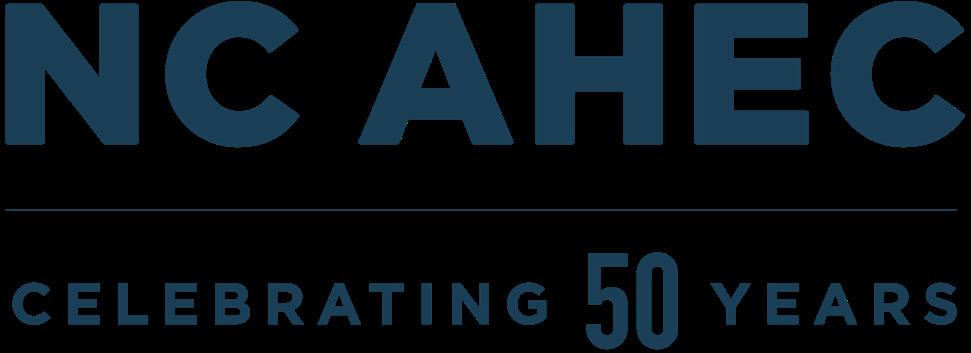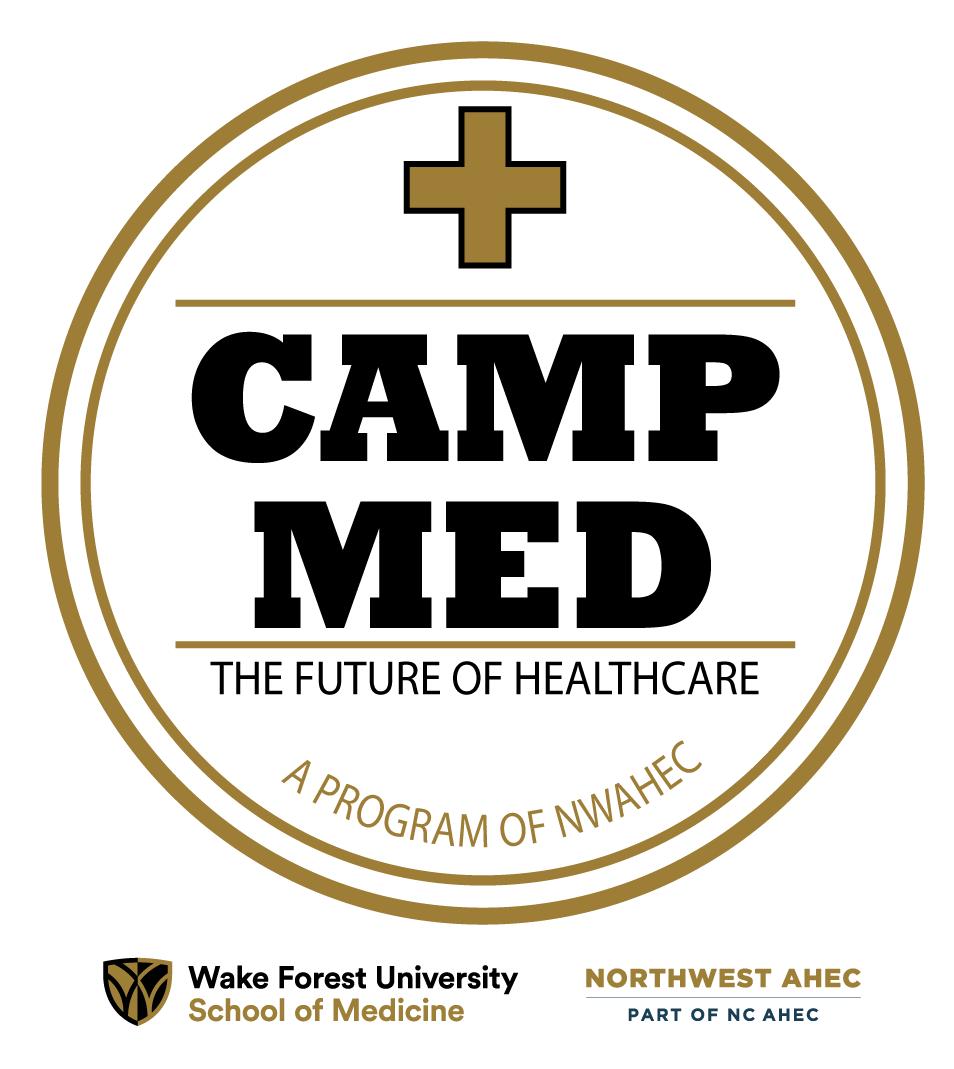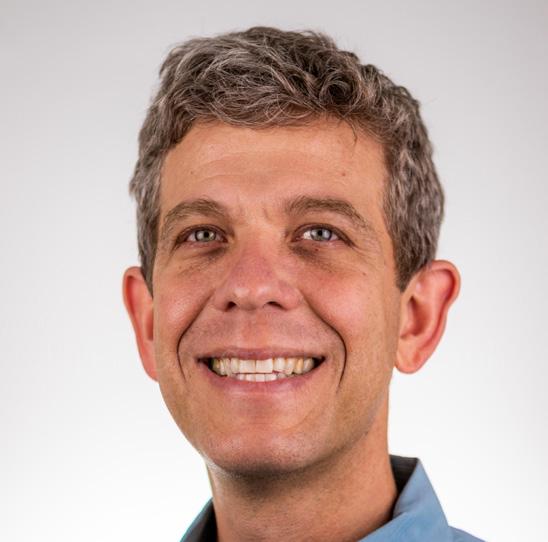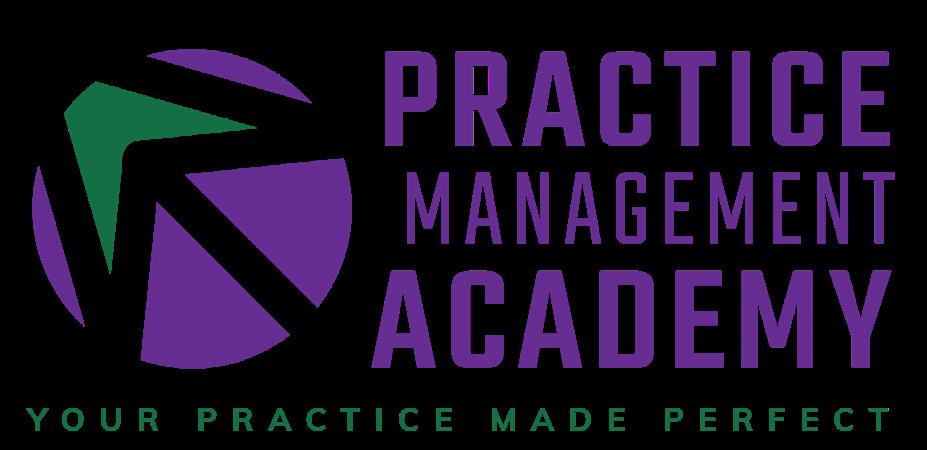





IN 1972, the North Carolina Area Health Education Center (NC AHEC) program was founded to address national and state concerns with the supply, distribution, and retention of health care professionals. In 1974, the State of North Carolina’s General Assembly supported a plan to create a statewide network. Today, thanks to federal and state legislative support, NC AHEC consists of the NC AHEC Program Office, a network of nine regional AHECs, and the Duke AHEC program.
Through the summer of 2023, NC AHEC is commemorating our 50 years of service to our state’s health care workforce by convening our staff in a statewide meeting for the first time in four years and sharing the narratives that have shaped our program’s culture since 1972.


Part of our celebrations include the launch of a new statewide logo with accompanying anniversary logo marks. Our new logo was designed to be bold, trustworthy, and simple. Our revised visual identity maintains use of our distinctive navy blue brand color and communicates the strength and endurance of our 50-year program to our state’s health care communities. Regional AHECs are also adopting new logos through 2023 to increase our program’s visibility as a system and to bring our organization under a single shared brand architecture.
This image, captured in 1993, pictures AHEC leaders from across the state at AREA L AHEC for a director’s meeting. To learn about our program’s founding, visit vimeo.com/ahecoralhistory.



THIS YEAR, WE’RE LOOKING BACK on 50 years of NC AHEC work and reflecting on how we can best focus and accomplish our mission over the next 50 years. Our future holds obstacles for us to overcome, innovations for us to apply, and promising outcomes for us to achieve. In this yearin-review, I invite you to explore the results we celebrated as a system this year and look into the window to see where we are headed.
education, and strengthen our financial and administrative processes. We’re excited for how their work is already advancing everything we do.
We also held send-offs off for our Associate Director of Student Services, Alan Brown, and our Director of Finance, Pratyush Mehta. We’re so grateful for their immense contributions to our work and wish them well in retirement.
This year, we welcomed new leadership into our Program Office, including Paris Andrew, Director of Diversity, Equity, & Inclusion; Caroline Collier, Associate Director of Operations & Diversity; and Jocelyn Brooks, Director of Finance & Administration. Their expertise will allow us to improve upon our commitment to health equity and an inclusive program culture, nurture our work in continuing
Eugene Mayer, our program director from 1978 to 1994, once observed that “our mission has remained constant even though our specific activities and organizational structures are very different from state to state, from AHEC to AHEC in a given state, and within a given AHEC over time.” In this report, you will discover some of the highlights of what we have accomplished as a system to further that very mission.

Alongside the success of and impacts of our program over the last year, we are excited to unveil our strategic plan through 2025 to lend you a road map to our service lines (pg 20). Using our core strategies to provide services and educational activities to recruit, train, and retain our health workforce, we’ve identified goals for each of our operational areas to create measurable success over the next three years.
Whether you are a health sciences student, practice manager, or a practicing provider, we are proud to support all you do to create healthy communities for North Carolinians.
Our future holds obstacles for us to overcome, innovations for us to apply, and promising outcomes for us to achieve.
In this year-in-review, I invite you to explore the results we celebrated as a system this year and to look into the window to see where we are headed.

As part of our mission to improve the geographic distribution, retention, and quality of health care providers throughout the state, NC AHEC develops initiatives that introduce pre-college youth to a vast array of health care professions. By emphasizing underrepresented minorities, rural communities, and economically/ educationally disadvantaged populations, we identify gaps in the educational pathways and work to foster interest in health care careers.
In 2021-22, our Regional AHECs maintained dozens of educational partnerships to offer thousands of school-based interactions, as well as virtual job shadowing, online summer camps, and other programs to reach students statewide.
Youth Health Services Corps (YHSC) programming continued at five AHECs—AREA L AHEC, EASTERN AHEC, GREENSBORO AHEC, WAKE AHEC, and SEAHEC—as part of a national recruitment strategy to engage students in health careers and raise awareness among participants of existing health disparities in their communities.
In New Hanover County, YHSC helped to shape the learning trajectory of Ismael Urbina, who established Wilmington’s first epilepsy support group through his high school’s HOSA-Future Health Professionals club. After studying at Cape Fear Community College and UNC School of Nursing, Urbina entered the workforce in an ICU unit and is continuing his education in the nurse anesthesist program at UNC Charlotte.
At MAHEC, the Minority Medical Mentoring Program (MMMP) coached seven BIPOC graduates from Buncombe County and Asheville City schools to support a total of 93 program graduates to date.
Paris Andrew joined the Program Office in May 2021 as Director of Health Careers and Workforce Diversity, Equity, & Inclusion (DEI) and provides leadership for these statewide activities across nine Regional AHECs and the Duke AHEC Program. Turn to page 18 to learn more about our DEI efforts in North Carolina.
Director of Health Careers & Workforce DEI paris_andrew@ncahec.net
With an emphasis on individuals from underrepresented minorities, disadvantaged and rural backgrounds, and first-generation college students, the NC AHEC SCHOLARS PROGRAM launched in 2018 continues to recruit students pursuing degrees in the health sciences to improve the diversity and distribution of health professionals in our state. Selected applicants participate in a two-year program including 40 hours of didactics and 40 hours of clinical work covering interprofessional education, social determinants of health, practical clinical skills, health disparities, and more.
NC AHEC participants belong to a national network of AHEC Scholars. Visit ncahecscholars.net for more information.
MELANEE MILLS and the NORTHWEST AHEC health careers team orchestrates this partnership with valued school system partners across thirteen counties.
In 2022, NORTHWEST AHEC continued its Camp Med activities in-person across thirteen counties in their region and conducted virtual programming for the third consecutive summer.
shared. “They taught us the warning signs to look for, how to safely administer the maneuver, and the importance of staying calm in those situations.”
While this popular program is designed to expose high school students to careers in health care and inspire reflection on social determinants of health, its curriculum also includes an overview of basic first aid and life-saving skills. CPR, proper use of a tourniquet, and how to perform the Heimlich maneuver are all included as part of the 20+ hour program.
When Alan Morales , 17, returned to his high school after participating in Camp Med over summer 2021, he was able to apply one of the skills he learned to a life-threatening circumstance in his lunchroom.
“One of the first techniques we learned at Camp Med was the Heimlich maneuver,” Morales
When Alan noticed one of his friends choking on a piece of food, he successfully performed the maneuver that he had learned and saved the life of the student.
“I’m really grateful that I had that knowledge and experience to help my friend,” he said. “Before Camp Med, I wasn’t even aware of all of the different aspects of the health field, and after helping my friend in that situation, I’m even more Interested now.”
Programming in 2022 attracted over 460 students like Morales across its virtual and face-to-face activities. Questions and requests for additional information can be directed to Melanee Mills, Health Careers and Workforce Diversity Coordinator, at mgmills@wakehealth.edu.

Camp Med is a program provided by a partnership between local school systems and Northwest AHEC of Wake Forest University School of Medicine and part of the NC AHEC system.

NC AHEC offers a variety of lodging opportunities for health sciences students who are completing communitybased rotations in North Carolina. The nine regional AHECs in our system provide short-term housing in more than 50 counties and in approximately 70 towns and cities across the state.
An updated housing tracking system hosted by the PROGRAM OFFICE has offered significant improvements to the efficacy of our housing operations. By reducing overbooking and errors related to gender occupancy and unaddressed requests, this system has enhanced the capacity for more effective data management for housing assignments and statistical data.
financial support for primary care and community residency training across three departments within the ECU Brody School of Medicine.
In addition to expanding and improving housing offerings, Student Services supports the Consortium for Clinical Education and Practice (CCEP), community-based interprofessional education experiences, and additional student & preceptor support initiatives .
CHARLOTTE AHEC took the lead on additional housing developments in 2021-22, including the implementation of an emotional support animal (ESA) policy—with several ESAs accompanying student assignments smoothly in 2022—and the revision of gender-neutral verbiage within the housing application.
In addition to providing over 9,000 nights of housing in their region alone, the Student Services team at EASTERN AHEC also provided significant
A number of regional AHECs supported the enrichment of Kenan Rural Primary Care Scholars from the UNC School of Medicine. The program equips its students to pursue rural, underserved patient practice in primary care specialties and supports the exploration of the unique complexities of patient care in rural North Carolina.
MAHEC hosted five scholars for four weeks of immersion in western North Carolina medical practices. GREENSBORO AHEC arranged housing in Rockingham County for scholars and mentored students in the development of scientific posters and supported them through individual consultations.
Since 1993, NC AHEC has supported community-based education through our Offices of Regional Primary Care Education (ORPCE). In 2022, NC AHEC made the difficult decision to end this program in response to a changing health care and health education environment. We recognize that support for preceptors is crucial, and although this program officially ended in June 2022, NC AHEC is reallocating funds previously used for preceptor payments toward the following investments to enhance student learning and community-based preceptor experiences.
The bulk of available funding will be used to develop an academic-practice partnership for nursing schools named the Clinical Instructor Partnership Program which supports faculty and students, and serves as a potential retention strategy for nursing staff.
This initiative will support the development of local student IPE experiences through grants to regional AHECs. Examples include a rural bus tour for students and faculty and appointing an interprofessional clinical rotation manager.
Regional AHECs will continue to identify and deploy alternative approaches to support and recognize community-based preceptors across their counties.
Expand the Consortium for Clinical Education and Practice (CCEP)
Prior recommendations to support community preceptors included facilitating student on-boarding through the CCEP. While NC AHEC has already separately allocated funding for long-term support of CCEP staffing, the program intends to support targeted IT and website upgrades in 2022.

NC AHEC trains the next generation of providers in our community-based residencies. Through a network of AHECbased and AHEC-supported programs i, family medicine, internal medicine, obstetrics and gynecology, pediatrics, psychiatry, and general surgery, we have always encouraged innovation in residency training across our state. In addition, AHEC residents are more likely to stay in North Carolina than nonAHEC residents, helping to reverse the trend toward shortages and the uneven distribution of primary care physicians in the state’s rural areas. In 2020-21, regional AHECs reported an average of 60 percent of graduates remaining in NC.
MAHEC partners with over 250 medical practices and hospitals across western North Carolina to train health care professionals in the communities that need them most. On average, 60 percent of MAHEC primary care graduates remain in North Carolina to practice. In addition to its 17 graduate medical education programs, MAHEC launched a new addiction psychiatry fellowship and child adolescent fellowship in 2022. Over the next three years, MAHEC will train more than 222 providers annually across all GME programs.
Residents supported by GREENSBORO AHEC continue to find careers in medicine in North Carolina after the completion of their AHECbased fellowships. Kiersten Mullis, who recently completed the Family Medicine Residency Program, is headed to Yanceyville, NC to join Compassion Health Care, a Federally Qualified Health Center (FQHC) in 2022.
The PROGRAM OFFICE continues to look at opportunities to more broadly support GME in North Carolina. This includes ongoing discussion with the North Carolina Academy of Family Physicians to co-lead a statewide learning collaborative. Further, NC AHEC is evaluating a range of activities to support community-based GME, including faculty development and networking, curricular support, coaching, and administrative consultation.
The GME collaborative continues to convent monthly meetings of GME Directors and quarterly meetings of Designated Institutional Officials representing hospitals and health systems statewide as well as an annual in-person meeting. These regular information-sharing and networking groups encourage GME professionals to support one another in their efforts.

Black River Health Services is an FQHC looka-like located in western Pender County. Executive Director of SEAHEC, Dr. Joseph Pino, and Dr. Janalynn Beste, Director of the Family Medicine Residency program, received a $500,000 grant from the federal Health Resources and Services Administration to support the creation of a rural family medicine track and teaching health center at Black River.
COMMUNITIES can be challenging. Though Pender County’s growth is booming, it’s highly concentrated to the coastal area. For those in many farm communities and rural areas, finding care means a 50-mile plus round trip to Wilmington. Adding to this problem, convincing physicians—new and established—to invest in and move to rural areas proves to be a difficult task.
Residents in the track will spend their first year working at Novant Health New Hanover Regional Medical Center with a half day each week at Black River. In their second and third years, they’ll provide full outpatient family medicine services to patients at Black River and will also care for patients at Pender Medical Center.
SOUTHERN REGIONAL AHEC was allocated reoccuring funds of 4.8 million dollars to distribute across all residencies in its region to implement general operational improvements to help create a dedicated workforce to meet the needs of its communities through systematic, interdisciplinary, and excellent patient care.
SEAHEC is hopeful that its new rural residency track in partnership with Black River Health Services will be part of the solution to these challenges that rural residents in Pender County face.
This opportunity will provide much needed training for the future workforce of our rural communities and the needed access to care for our rural community members.
As part of our vision to lead the transformation of health care education and services in North Carolina, we have always encouraged innovation in residency training that focuses on improving patient experience and increasing access and quality in advanced models of primary care.
Funds will be used to recruit new faculty, obtain accreditation to expand residency programs, develop rural education hubs, support interprofessional primary care programs in community-based settings, and to develop curricula to orient students to soical determinants of health, among other focus areas.
Our continuing professional development (CPD) programs are important resources that provide health care professionals with the training and continuing education they need to meet state licensure and specialty certification and to stay abreast of new research, emerging technologies, and the latest innovations and advancements in their fields. We support a diverse range of CPD activities that encourage innovation and meet health professionals’ licensing and certification requirements in seven health disciplines.
WAKE AHEC is working with the NC Medical Board to develop three distinct webinar series related to intimate partner violence (IPV), elder abuse, and controlled substances. Better identification, screening, and management of these health outcomes are supported by these sessions through instruction in conducting screenings, reporting, documentation, and other topics specific to each of these subject areas.
In addition to offering nearly 1,400 unique CPD programs with over 30,000 participants in 2021-22, EASTERN AHEC also delivered the Child Mental Health in Primary Care educational initiative. This project offers case consultations, a webinar series, online resource repository, and scholarships to the REACH Institute, along with behavioral health credits for participating nurses.
Associate Director of CPD caroline_collier@ncahec.net

NC AHEC saw 49,462 unique participants in a combination of 9,600 virtual, hybrid, and in-person programs in the state over 2021-22.
Eagle Physicians, a network of multi-specialty providers, reached out to GREENSBORO AHEC for support in planning a CE event for their clinicians.
In March 2022, CPD and Practice Support teams co-hosted a live virtual learning event for the medical group, with 35 physicians, nurses, allied health professionals, and practice managers in attendance.
“Partnering with GREENSBORO AHEC proved to be an invaluable collaboration,” shared Jennifer Willard, a PA with Eagle Physicians.
“The development of a virtual training for our organization would have been impossible without their knowledge and resources, as well as their genuine support for our success. I look forward to the opportunity to partner with them again!”
By 2033, North Carolina faces an estimated shortage of nearly 12,500 registered nurses and slightly more than 5,000 LPNs. According to data aggregated by the Sheps Center and NC Board of Nursing, our state will require a combination of increasing graduate supply, retaining current nurses, and possibly recruiting nurses that have left the workforce to address projected shortages. That’s why regional AHECs across the state are employing a diverse set of strategic programs to approach the shortage crisis from different angles.
In collaboration with WakeMed Nursing Education, WAKE AHEC has designed a pilot training to support nursing supervisors and educators in practically applying Practice, Study, Do, Act (PDSA) processes to quality improvement in clinical settings. Many nurses are able to to identify areas for improvement in their practices, but report a lack of time, support, and confidence in their abilities as reason for not pursuing patient-centered workflow improvements. Wake AHEC will provide participants with a didactic session followed by dedicated time to develop an applicable project with a mentor as part of this pilot.
CHARLOTTE AHEC offers a number of nursing certification review courses essential to retain practicing nurses in NC. Those topics include Certified Nursing Educator (CNE) exam prep, medical surgical nursing review, and more.
NC Nursecast, an interactive, web-based tool that forecasts the future supply and demand for nurses, projects the estimated supply and demand for Registered Nurses (RNs) and Licensed Practical Nurses (LPNs) across AHEC regions in 2033.

The RN REFRESHER PROGRAM, offered as part of a collaboration between NC AHEC, the UNC School of Nursing and UNC Digital and Lifelong Learning, includes a theory course and clinical practicum designed for nurses who have lapsed in their licensure and active nurses who are looking to update their knowledge. Upon successful completion of both the didactic and clinical portion of the course, participants are eligible to apply for reinstatement of their nursing licenses through the North Carolina Board of Nursing.
—KAY RAY, RN
Completed program 20 years after her last clinical practice
“I’m so thankful for the NC AHEC RN Refresher Program. It gave me a practical way to gain back my license at a reasonable pace and helped me understand some of the changes in the nursing field since I had practiced.”
Practices need to position themselves for new payment models, incentive programs, and other health care reforms while focusing on patient-centered care. Our practice support coaches are trained to work with practices to transform the way care is delivered in primary care, specialty practices, and behavioral health care settings.
Our team of coaches supported 1,047 practices with a variety of essential operational needs including behavioral health integration, quality improvement, COVID-19 response, Medicaid and Medicare managed care programs, workflow redesign, EHR optimization, telehealth best practices, HIE training, community health worker integration and general practice management consultation.
A coordinated approach to behavorial health. The NC DHHS Division of Health Benefits has partnered with NC AHEC to provide statewide practice support, education, and technical assistance to Advanced Medical Home Plus (AMH+) and Care Management Agency (CMA) organizations. AHEC’s program is designed to equip Tailored Care Management (TCM) candidates with the tools and knowledge to effectively provide care management services to North Carolina’s Tailored Plan beneficiaries.
hosted by NC AHEC and regional AHECs, and various types of continuing education credit are available, depending on the topic.
State Designated Rural Health Centers. The NC Office of Rural Health has partnered with AHEC to support rural health centers and independent private practices or free medical clinics that have applied or plan to apply to become rural health centers. These institutions are an integral part of the health care safety net for rural and underserved residents.
The TCM Learning Collaborative sessions provided at no cost are designed to provide content experts and peer-to-peer learning opportunities to AMH+ and CMA organizations as they prepare for TCM implementation.
NC AHEC also provides monthly TCM related course offerings to both AMH+/CMA candidates and the community. Educational events are
To provide continued support, NC AHEC AHEC conducts a comprehensive practice needs assessme and action plan based on mutually agreed upon priorities, and offers coaching to close identified operational and patient care gaps.
Presented by SOUTHERN REGIONAL AHEC on behalf of NC AHEC, the 9-month Practice Management Academy opened for registration in August 2022 and quickly met its cap of 75 participants for its initial cohort.
The NC AHEC Practice Management Academy offers cost-effective and relevant training for practice managers, as well as opportunities for updating their knowledge and connection with their peers. The Academy is endorsed by the NC Medical Group Managers Association (MGMA) and covers a range of topics important to running a medical practice, including financial management, human resources, quality improvement, and more.
An effective practice manager is vital to the success of the modern medical practice, but most practice managers learn on-the-job and
struggle to locate training that fits their busy schedules and limited budgets. The Academy’s first offering—Practice Manager Bootcamp—is designed to identify the basic knowledge and skills a practice manager needs to make their practice thrive.

Those who complete the bootcamp will receive formal recognition of their accomplishment and CEU credits that can be applied to the continuing education requirement of the MGMA Certified Medical Practice Administrator certification.
• Ensure accurate and efficient financial management through the differentiation between insurance payment models, account management, and composition of effective policies and procedures.
• Manage human resources through the development of employee handbooks, comprehensive evaluations, and best practices for regulatory and continuing education.
• Demonstrate confident leadership through strategic planning and cultural competence.
• Select, implement, and manage technology through EHRs and other methods.
• Employ effective quality improvement strategies.
Director of Library Services monique.mackey@arealahec.org
AHEC librarians support any and all information needs of North Carolina’s health care providers. From rural family physicians in the mountains to nursing student near the coast, NC AHEC libraries will support any student or provider’s clinical, educational, or research activities.
The library at GREENSBORO AHEC worked to build a data collection tool with customized reporting, playing a key role in the first-in-the state Commission on Collegiate Nursing Education (CCNE) of the Cone Health nurse residency program.

In addition to the services of regional AHEC libraries, anyone and everyone can access the AHEC Digital Library. We welcome individual guest users, who may use any of the resources that are not restricted by license to members.
The AHEC library network touches every county in North Carolina, with over 115,000 service interactions in 2021-22.
SOUTHERN REGIONAL AHEC librarians drew from their robust collection of instructional material on informational literacy, evidence-based medicine, and health literacy to contribute an overview of health literacy to all new employee orientations at their AHEC.
WAKE AHEC continues to offer their copyright expertise and resources to all regional staff and advises AHEC staff across the state on copyright inquiries and issues. The library also conducts trainings on the topic for students and faculty in WakeMed ‘s Nursing Education department.
AREA L AHEC Vice President and service line leader for Library Services Monique Mackey served as a co-author of “Successful Trial of Practice Facilitation for Plan, Do, Study, Act Quality Improvement,” published in the SeptemberOctober issue of the Journal of the American Board of Family Medicine. The study engaged 32 practices serving rural patients to develop and implement PDSAs nested within key drivers of improving blood pressure control. 97 percent of participants recommended similarly structured services to other primary care practices.
Instructional services. We help providers learn how to make the best use of our resources, including full-text journals, books, and clinical and educational tools in the AHEC Digital Library.

A new streamlined AHEC Digital Library logo reflects the bold, type-based quality of our new statewide logo while appearing familiar to the health care trainees and professionals that use our services.

Reference service. Our librarians provide a valuable reference service to connect students and providers to the literature and materials needed to support their work.
By using the AHEC Digital Library, members can access full-text journals, books, and electronic databases of the literature, as well as links to carefully evaluated health information websites and clinical and educational tools.
The AHEC Digital Library is a portal to AHEC library services, information, and education.
The ADL ensures that all providers in the state have high-quality health information readily available through a variety of membership categories, ranging from access to free resources to paid subscriptions.
DON’T HAVE AN ADL MEMBERSHIP? Request an account by visiting library.ncahec.net.

When visiting the AHEC Digital Library (ADL) homepage, simply use the Need Assistance button and complete a short form detailing the request. We connect health care providers and health science students with information, organizations, and other professionals and collaborators at every step in their career.

In addition to fulfilling the work owned by our six core service lines, our program also coordinates a number of designated statewide projects. These projects often cross service lines and our model to recruit, train, retain the health care workforce needed to create a healthy North Carolina.
Diversity, Equity, and Inclusion. In 2021, NC AHEC launched a 12-part Diversity, Equity, and Inclusion (DEI) Module series for Primary Care Clinical Providers and Non-Clinical Staff. This PROGRAM OFFICE statewide DEI project was hosted by MAHEC and included collaboration with multiple regional AHECs and an advisory group of DEI and health equity experts to develop the curriculum topics.
and Partnership, NC Action to Address Health Inequities, LGBTQIA+ Health, DEI Recruitment and Retention, DEI Data and Dashboards, and System Accountability.
With goals and outcomes set by the Program Office and work led by regional AHECs, these initiatives touch on multiple areas of our mission statement. Our 2021-22 statewide projects include Diversity, Equity, and Inclusion; Workforce Planning; the Community Health Worker Program; and Healthy North Carolina 2030.
Many counties were engaged statewide, with 34 professions represented among over 580 trainees ranging from registered nurses, care coordinators, social workers, health educators, physicians, and others.
Delivered as micro-learnings and TED Talks with various forms of active engagement, the module topics included Structural Racism, Cultural Humility, Implicit Bias, Communication in Healthcare, Microaggressions, Social Determinants of Health, Community Engagement
Workforce Planning. NC AHEC leads a multipronged approach to workforce planning that has developed the NC Center on the Workforce for Health, a collaboration with the North Carolina Institute of Medicine (NC IOM) and the Sheps Center.
The Center will provide a forum for health employers, workers, educators, regulators, policymakers, and others throughout North Carolina to convene, discuss challenges and opportunities, share best practices and lessons learned, identify potential solutions and metrics for success, and monitor progress toward addressing these challenges. The Center will leverage data, policy and best practices research, and inputs from participants to identify priorities
and propose approaches and solutions.
The Center met three times in 2022 with quarterly meetings planned in the future. Part of the work of the Center includes the NC Sentinel Network, which serves as a source of ongoing data collection, analysis, and interpretation of the health care workforce in NC through employer surveys.
Healthy North Carolina 2030. Led by the NC IOM and NC DHHS, Healthy North Carolina 2030 (HNC2030) lays out ambitious goals to improve the health and well-being of the people of our state and serves as the foundation for the North Carolina State Health Improvement Plan (NC SHIP).
NC SHIP has chosen Results-Based Accountability™ (RBA) as the framework for driving improvement in the population indicators or measures for good health and well-being throughout this decade. NC AHEC is building the infrastructure to support RBA training, in collaboration with the Division of Public Health (DPH) and the Foundation of
Health Leadership & Innovation (FHLI). Those who complete the course are then provided telementoring through Project ECHO in an “all learn, all teach” approach to facilitate movement from concepts to practice. As a result of this training, 98 percent of local health departments have demonstrated the capacity to apply RBA concepts to their community health work. This, in turn, contributes to the NC SHIP indicators trending in the right direction.
Community Health Workers Program. Now in its third year of activity, the NC AHEC Community Health Workers (CHW) Program continues to grow as a statewide program.
Advanced Medical Home (AMH) CHW Integration Practice Support coaching, led by AREA L AHEC, is crucial in helping AMHs improve chronic disease self-management and health outcomes, enhance the patient experience, reduce emergency room utilization and hospital readmissions, as well as impact health equity and overall healthcare
costs. NC AHEC coaches are receiving mentoring in building organizational health equity capacity from Community Healing through Activism and Strategic Mobilization (CHASM) to support this work.
Community Health Worker specialty training includes the production of online modules to prepare CHWs for AMH integration. To date, MAHEC has released six of these courses on behalf of NC AHEC, with 98 percent of participants recommending the trainings to others. CHARLOTTE AHEC and GREENSBORO AHEC are producing additional modules for statewide use
In addition, the monthly CHW Virtual Peer Learning Collaborative is reaching the end of its second year with over 900 participants since its inception.
The 2022 NC CHW Summit will be held in December 2022, with SOUTHERN REGIONAL AHEC leading planning in collaboration with SEAHEC and AREA L AHEC.
Our 2023-25 strategic plan builds on 50 years of success in leveraging the resources of our State’s academic institutions to build and support our health workforce, especially primary care in rural and under-resourced communities.
To demonstrate how our services are helping to turn the curve on health workforce development in NC, we have chosen the following population-level indicators to measure our results:
Our next 50 years promises to be full of challenges, opportunities, and great results. We have a firm foundation off of which to build. This strategic plan provides a roadmap for us—one in which we all have a part to play. If you have ideas for enhancing the plan’s implementation, or anything that will help us achieve our mission, we want to hear from you.
• Number of NC counties with a primary care workforce to county population ratio of 1:1,500
• Percentage of licensed health care professionals that participate in NC AHEC continuing professional development (CPD) activities
• Number of NC counties with a percentage of underrepresented minority health care professionals that equals or exceeds the percentage of underrepresented minority individuals in the county
Provide and coordinate services and support
To ensure an appropriate supply of trainees/students pursue health careers, particularly those who reflect their communities
To encourage trainees/students and health care professionals to practice in interprofessional and primary care settings in rural and under-resourced communities
To retain the health workforce, with a focus on the diversity of providers, interprofessional teams, and primary care settings in rural and under-resourced communities
We will continuously assess the effectiveness of these core strategies toward achieving our result indcators and adjust this work as needed while also seeking out new opportunities.
• K-12th grade students, particularly from racially and ethnically diverse, rural, and under resourced communities, are exposed to various health professions allowing them to consider those professions as possible future careers.
• Upon graduation from the AHEC Scholars Program, students enter the health workforce, preferably in NC and in a rural and/or underresourced community.
• Safe and convenient short-term housing is available to any health science student who wants to train at a community primary care training site, especially in rural and under-resourced areas of NC, and needs housing.
• Healthcare workforce is supported and expanding through a streamlined clinical placement process for students, sites, and schools in NC.
• Residents in AHEC-based and AHEC-supported primary care residencies stay to practice in NC, particularly in rural and under-resourced communities.
• Healthcare providers and health care teams, particularly in rural and under-resourced communities, have access to coordinated, innovative, and efficient training activities.
• The state’s health workforce provides high quality, cost-effective, and inclusive care to all individuals in NC, while thriving in a value-based care environment.
Under the RBA framework, each of our Service Lines and Focus Areas is a program that contributes to the population result. We have developed Goals for oue Service Lines and Focus Areas to better align our work.
• All current and prospective healthcare professionals in NC have access to evidence-based information to promote the health and well-being of the communities they serve.
Under each, we describe the activities we are currently doing tto turn the curve and what we will implement over the next three years to further our impact.
All programming and initiatives integrate DEI principles to develop and support a health workforce that reflects the communities served.
Health workforce shortages and needs are identified and addressed through data and coordination with stakeholders.
The healthcare workforce in NC is ready to work in a collaborative, patient-centered, and teambased care environment.
• NC AHEC operates as a system that responds to changes in the healthcare workforce and landscape through effective and efficient utilization of available resources.
• NC AHEC incorporates strategic initiatives that meet current needs and adapts to the changing healthcare landscape through innovative approaches.
GME CPDHugh Tilson, JD, MPH, Director 145 N. Medical Drive, CB 7165
The University of North Carolina at Chapel Hill Chapel Hill, NC 27599-7165 919-966-2461 | ncahec.net
Debby Futrell, PharmD, President & CEO PO Drawer 7368 Rocky Mount, NC 27804-0368 252-972-6958 | arealahec.org
Joann L. Spaleta, Interim Executive Director
Atrium Health PO Box 32861 Charlotte, NC 28232-2861 704-512-6523 | charlotteahec.org
EASTERN AHEC
Lorrie Basnight, MD, Executive Director 2600 West Arlington Blvd. Greenville, NC 27835-7224 252-744-5221 | easternahec.net
GREENSBORO AHEC
Terry Lynn, Interim Program Director
Moses Cone Health System 1200 N. Elm St. Greensboro, NC 27401-1020 336-832-8025 | gahec.org
SOUTH EAST AHEC
Joseph Pino, MD, Executive Director 2511 Delaney Ave. Wilmington, NC 28403-6003 910-343-0161 | seahec.net
SOUTHERN REGIONAL AHEC

Sushma Kapoor, MD, President & CEO 1601 Owen Drive Fayetteville, NC 28304-3425 910-323-1152 | southernregionalahec.org
WAKE AHEC
MOUNTAIN AHEC
Francisco Castelblanco, AHEC Director 121 Hendersonville Rd. Asheville, NC 28803-2868 828-257-4400 | mahec.net
NORTHWEST AHEC
Michael Lischke, EdD, MPH, Director
Wake Forest University Health Sciences Medical Center Blvd. Winston-Salem, NC 27157-1060 336-713-7700 | northwestahec.wakehealth.edu
John Perry III, MD, Executive Director 3024 New Bern Ave., Suite 301 Raleigh, NC 27610-1255 919-350-8547 | wakeahec.org
DUKE AHEC PROGRAM OFFICE
Marvin Swartz, MD, Director
Duke University Medical Center, Box 3173 Durham, NC 27710 919-684-8676 | dukeahec.mc.duke.edu
